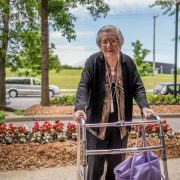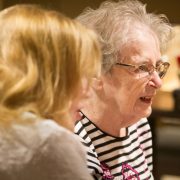Creating a Safe and Secure Environment for Residents with Dementia in Memory Assisted Living
Dementia is a silent epidemic that’s affecting the lives of millions of Americans. Unfortunately, there’s still no cure for this debilitating condition, so the next best thing that families can do is to move their family member into memory assisted living.
The primary goal of any memory assisted living facility is to create a safe and secure environment for residents. But what exactly does that entail?
Key Elements of a Safe Environment in Memory Assisted Living
Every memory assisted living facility should have these five key elements to ensure safety and security among residents:
Well-guarded entry and exits.
- A lot of patients living with dementia are prone to wandering off, so it’s very important for facilities to have secured entry and exit points.
Emergency systems.
- Residents should have access to emergency response systems whenever they need help. This can be a call button or a pull cord in their rooms.
Fall preventive measures.
- Since most residents are at a higher risk for falls, it’s very important for memory assisted living facilities to be equipped with efficient fall prevention measures. For instance, rooms and hallways should be adequately lit and bathrooms should have non-slip floors.
Fire safety measures.
- All memory assisted living facilities should follow the standards set by their state’s fire safety regulations. Aside from well-placed fire extinguishers and accessible fire exits, it’s also essential for staff to be trained about fire safety protocols and how to secure residents in the event of a fire.
The Importance of Staff Training in Memory Assisted Living
Staff play a crucial role in keeping residents safe and secure. This is why it’s very important to train them in different areas where they can provide the best care possible to residents:
- All staff should be trained and licensed based on the standards set by the state. They should specialize in caring for residents with Alzheimer’s and undergo regular training to update their knowledge. Whether they’re the primary caregivers or assistants, they should be able to pass the necessary qualifications.
- All staff should know how to perform basic CPR and other first aid measures. They should also learn how to manage behaviors in patients with dementia and offer them support when dealing with behavioral struggles.
Finally, staff should be committed to caring for patients daily and giving them the comfort and security that they need. Living with Alzheimer’s and other related dementias is not easy, especially for the elderly.
They also need to deal with the huge change of moving into a completely different living environment. Staff should be able to give them the space they need to be as independent as possible.
Looking for excellent memory care in Lincoln, Nebraska? Click here to learn more about Fallbrook Assisted Living!
Fallbrook Assisted Living is proud to offer its services to Fremont, NE, and surrounding areas and cities: Arlington, Cedar Bluffs, Ames Nickerson, Fontanelle, Arlington, Leshara, Colon, and Hooper









